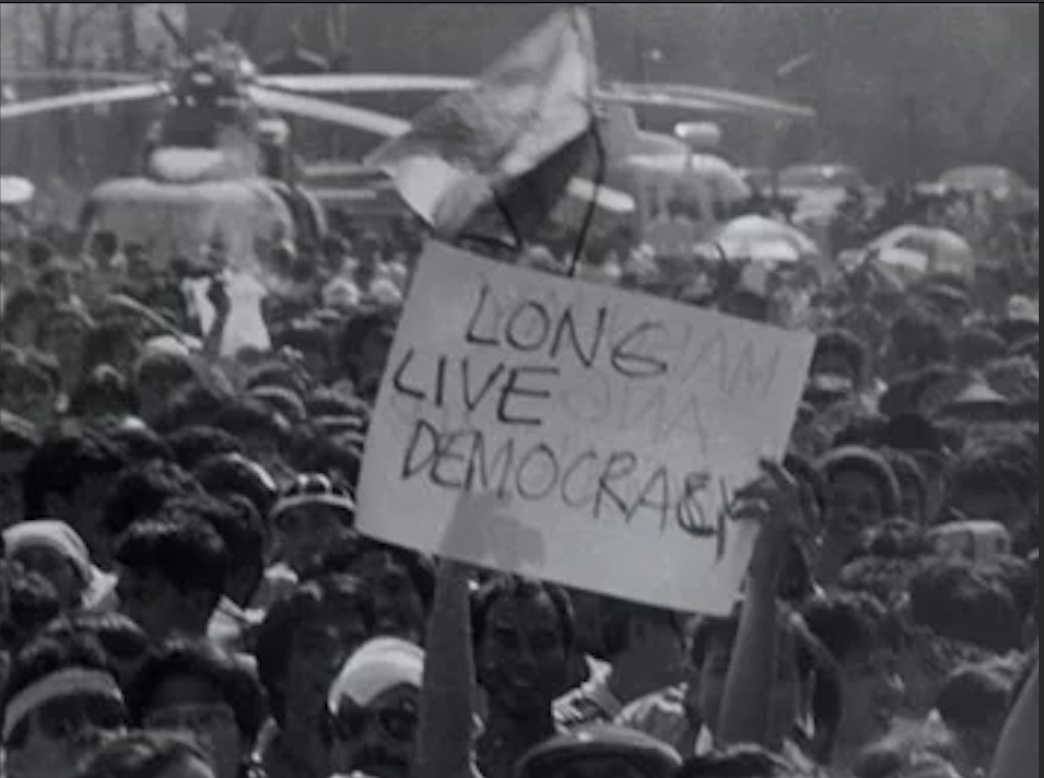These days, the truth seems to be more of a suggestion than actual fact. In an era when disinformation and historical revisionism has seeped itself so deeply into the collective consciousness, our very history has become a matter of public debate.
In a recent interview with reporters, actor-turned-neophyte senator Robin Padilla urged the public to hear both the Aquino and Marcos narratives before judging.
Senator Robin Padilla urged the public to hear the historical narrative of the Marcos family and not just the popular account of what is now part of Philippine history.
— Inquirer (@inquirerdotnet) July 18, 2022
READ: https://t.co/dAReL3aqp3 pic.twitter.com/MKg0v5qFvN
“Katulad ngayon, siyempre ngayon natin nakikita ‘yan, sa matagal na panahon narrative ng after People Power ang naririnig natin. So ngayon, maririnig naman natin ang narrative ng Marcos. So, hindi natin pwedeng sabihing tsismis ito kasi ito ‘yung narrative ng Aquino, iba sa narrative ng Marcos,” Padilla said.
(We see now, for the longest time, we have been hearing the narrative after the People Power [revolution took place]. So now, we are going to hear the narrative of the Marcoses. So, we cannot say that that is just gossip because the narratives of the Aquinos and the Marcoses are different.)
“Ang dapat, tayong mga Pilipino parehas nating pakinggan at tayo ang humusga kung sino ang palagay natin—hindi ‘yung kung sino ang tama—kung ano ‘yung totoo,” he added.
(We, Filipinos, should listen and judge on what we think—not who is right—is the truth.)
Padilla’s statement came not long after actress Ella Cruz’s comment on history as tsismis.
'DON'T CONFUSE HISTORY AND CHISMIS.'
— Inquirer (@inquirerdotnet) July 3, 2022
Public historian Ambeth R. Ocampo decries actress Ella Cruz's controversial comment that history is like tsismis yesterday, July 2.
RELATED STORY: https://t.co/Vg8LMqgDAi pic.twitter.com/YpuLYmRBHD
These statements are not at all rare to find these days. Both Cruz’s and Padilla’s sentiments are most likely shared by many Filipinos, especially those who get their history lessons on social media. History is no longer a monolithic structure of dates, figures, and events but something that can be contested.
Instead of straight facts, history has been reduced to mere “tsismis” where we have to listen to “both sides” of the story in order to “decide for ourselves.”
(How) history is being framed
In Lauren Greenfield’s 2019 documentary, “The Kingmaker,” Imelda Marcos herself said, “Perception is real. The truth is not.” Following her advice, let’s take a closer look at how historical events can be perceived from different perspectives.
Much like our history, Sri Lanka’s past has also been the subject of contention. The Sri Lankan Civil War was a conflict that, too, lasted for decades and only came to a close in 2009. The conflict was between two groups: the Sinhalese-dominated Sri Lankan government and the Liberation Tigers of Tamil-Elam (LTTE)—who have been branded as terrorists by the US Federal Bureau of Investigation.
The LTTE, representing the Tamil minority oppressed by the Sinhalese, was fighting for the Tamils’ own statehood. During the war, people were tortured, abducted, and murdered. These abuses continued even after the civil war was concluded. A report has found that the perpetrators are police or military intelligence officers.
Innumerable casualties have been either forgotten or willfully ignored by the government. Any public demonstrations or allusions to the atrocities committed during the war are met with silence at the very least, and violence at most.
LOOK: People crowd inside the Sri Lanka's presidential palace, in Colombo on July 10, a day after it was overrun by anti-government protestors. | 📷Arun SANKAR / AFP pic.twitter.com/DpV0qco014
— Inquirer (@inquirerdotnet) July 11, 2022
The end of the civil war was supposed to usher in a new era of peace, but the wounds incurred during the decades-long conflict—along with justice—have been left mostly unaddressed. Now, Sri Lanka is facing a host of new problems: bankruptcy, inflation, and social unrest.
As is the case with our own revolution, the facts of the Sri Lankan Civil War have been rewritten. The narrative suits whoever holds power, while the truth is being held hostage. The revolutionaries who fought for their own statehood have been branded as terrorists (arguably their version of red-tagging) and those who dare speak against the atrocities that have been committed are faced with punishment.
When it comes to our historical narrative, an important question to ask is why are historical events like martial law and the EDSA revolution being presented as a feud belonging to two families? A lot of the common rhetoric online shows people pooling support for the Marcos side and dismissing everyone else as a “Dilawan” or “Pink-lawan.”
Painting the story to have only two sides takes away our moral responsibility to carry our history with us. For the most part, it absolves us of any role and accountability to take ownership over what happened.
Take Padilla’s statements as an example. He clearly outlined two narratives: the Aquino one and the Marcos one. This dichotomized view of history sanitizes—and arguably completely erases—the role of the main actor in this event: the Filipino people.
Political machinations on either side can only go so far without the efforts of ordinary citizens. Our blood, sweat, and hard work have been erased by how our history is currently being framed.
What are facts, anyway?
In a rebuttal to Cruz’s tsismis comment, popular historian Ambeth Ocampo said, “History may have bias, but it is based on fact not opinion.”
History, unlike science or mathematics, is not a “hard” study. There’s a certain amount of subjective input involved, but there are facts and figures we can confidently rely on to paint an accurate picture of what it was like.
So for those who are still wondering, here are some fast facts.
According to international human rights group Amnesty International, there were 107,240 primary victims of human rights violations during martial law, 70,000 people arrested, mostly arbitrarily without warrants of arrests; 34,000 people tortured, and 3,240 killed by the military and the police.
And those are just the confirmed figures.
Let’s also not forget the millions of people who flooded the streets during the momentous four-day rally that won back our democracy.
And aside from facts and figures, we still have people who lived through those events that serve as living testimonies whose experiences should not be invalidated.
The truth remains
While history is multifaceted, we can’t treat it like we’re mediating conflict. Sure, listening to both sides could be an appropriate response to a neighborhood quarrel but perhaps not so for events of national, social, and historical importance. Respecting each other’s opinions on how we view history isn’t that much better, either, if we really want the truths of our past to surface.
No matter which way the narrative is spun, the dead are still dead, the economy is still suffering, and justice has not yet been served.
The war against propaganda and historical distortions may not stop any time soon, but facts will stay as they are. Solid, unbreakable, and incorruptible against lies.




